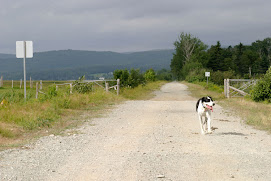The Cambridge Forum--“bringing people together to talk” for 42 years—is an amazing local resource. Last week the speaker was self-described “provocateur” Michael Schellenberger, author (with Ted Nordhaus) of the controversial essay titled “The Death of Environmentalism.”
Schellenberger delivered what a friend who joined me called “a tour de force.” He was frequently challenged during the Q&A, and he held his ground with admirable diplomacy. The talk was videotaped and will be available soon on the WGBH Forum Network website.
Schellenberger and Nordhaus’s argument is summarized by the section titles of their 2007 book, Breakthrough: they reject “The Politics of Limits,” and advocate for “The Politics of Possibility.”
The authors question the effectiveness of “environmental tales of tragedy” told by Rachel Carson and others as quasi-religious narratives that begin with unspoiled Nature as paradise, which is then destroyed by fallen man’s over-consumption and materialism, and finally redeemed by sacrifice; limits to growth, sustainability, recycling, “another way,” “learning to live with less” become paths to salvation.
Schellenberger argues that only a wealthy society that has taken care of the material needs of its citizens can spend money on “post-material needs”—quality of life issues like clean air and clean water. Thus the earlier (and very real) successes of the environmental movement were due more to post-war prosperity than to the dissemination of an eco-tragedy narrative.
In the current global warming discussion, Schellenberger argues that anthropogenic global warming poses a significant threat to the planet, but he observes that the apocalyptic rhetoric of Al Gore, James Hansen, and mainstream environmental groups has only produced fatalism, apathy and little progress toward the goal of reducing CO2.
The authors note that focusing on limiting CO2 by limiting growth and energy use is advocated only by the world’s wealthiest people, environmentalists who have all their material needs met by the energy expenditures of the past. Rather than pursue the unrealistic goal of preventing the developing world from attaining the benefits in health, education, and material comfort that come with energy use, we should address global warming by developing carbon-free energy with the help of large government investment in research and development.
Thus we should abandon what he calls the “pollution paradigm” and adopt a politics of possibility, the belief that a breakthrough to new cheap zero-carbon energy sources is possible—and essential for our survival.
Schellenberger made cogent arguments for government support of energy R&D, claiming that the development of the computer chip and the Internet were assisted by government support—largely from the military. He proposes a mere $30 to $50 billion annual investment—pocket change in the Age of Obama. He noted that venture capitalists hope to get one success for every nineteen failed investments, so government money picking winners ought to be a workable model.
Although I was impressed with Michael Schellenberger’s intelligence and much of his analysis, I don’t agree with his foundational premise, that CO2 must be limited if we are to survive. This is not mere willful blindness as many AGW acolytes accuse; 31,000 scientists have signed the Petition Project statement that “there is no convincing scientific evidence that human release of carbon dioxide…is causing…catastrophic heating of the Earth's atmosphere.” If CO2 and carbon content dominate our energy decisions, we end up making bad choices. We label natural gas a dirty fuel, but wood “bio-fuel”--clear-cutting forests and burning millions of trees--is by some pretzel logic considered “green”? Rather than carbon footprints, we should consider development footprints and ask if covering millions of acres with switchgrass, solar panels, wind farms and long-distance transmission lines is more environmentally sound than the minimal disturbance caused by offshore drilling platforms and nuclear power plants.
In addition, I wonder if government-run R&D will lead to the next Internet, as Schellenberger hopes, or simply to more ethanol boondoggles. I believe in human ingenuity but any technology can be made into a winner with enough government subsidy.
The special interest groups, lobbyists and businesses slurping at the government trough make it nearly impossible to declare a loser a loser.
Developing new energy sources is a good idea for many reasons, and government-funded R&D can clearly play a role, but none of the current “alternative” energy sources except nuclear power show even a remote potential for replacing the world’s huge supplies of cheap carbon-based energy. Oil, gas and coal will continue to bring prosperity to the globe for at least the next century. We need everything out there: R&D, baby, R&D, and wind farms in North Dakota and new transmission lines through my back yard and cheap solar roofing panels. Increase efficiency everywhere, but also build nuclear plants and mine oil shale and don’t forget, drill, baby, drill.
Friday, May 15, 2009
Thursday, May 07, 2009
Hysteria
Rick Bass reviews EARLY SPRING: An Ecologist and Her Children Wake to a Warming World By Amy Seidl
What evidence is there of this tilting, sagging, slumping and burning, you may ask?
I don't know whether to laugh or cry. Has neither of these people ever seen a storm knock down a tree branch, or daffodils covered with snow?
"Early Spring" is the kind of book we'll be seeing more of, as the natural world tilts, sags, slumps, and burns, growing ever-more heated, and with biology's whispered promises of impermanence dialed up to a such a volume now that even those who might not wish to consider such things can hear them roaring in the near distance.
What evidence is there of this tilting, sagging, slumping and burning, you may ask?
In Vermont, a freak storm rips the limbs from the maple trees, daffodils emerge early, winter grass remains green deep through autumn and into winter, and bobolinks decline.
I don't know whether to laugh or cry. Has neither of these people ever seen a storm knock down a tree branch, or daffodils covered with snow?
Joan Vennochi admits that the image of the "adorable" Obama family is "managed expertly by the White House with help from the media." She also admits that Sarah Palin's family life "brings baggage that is especially difficult for a female candidate to overcome." But this female member of the press is happy to help out with the media manipulation of the Obama image, and happy to make life more difficult for a female politician. She has compiled a snarky repetition of old baggage about Sarah Palin. An absurd internet rumor from last summer about Palin's Down's Syndrome daughter. Sarah Palin's daughter's ex-boyfriend's father's legal difficulties. Bristol Palin's ex-boyfriend's sister calling the Palin family "white trash" (so Vennochi doesn't have to say what she's obviously thinking.) At the same time, we hear about the "adorable First Puppy" and "adorable First Daughters" but none of Obama's baggage that is far more damaging than anything brought up about Palin--Tony Rezko, Jeremiah Wright, Bill Ayers, etc.--things actually connected to the President and not to people two degrees removed from him.
Although Sarah Palin's conservative politics offends more liberals than conservatives, the primary response to her is class-based; both liberal and conservative elites see her as white trash, while ordinary working people connect with her as a reflection of themselves. When elitists look down their noses at Palin, it only consolidates her support among many voters.
Although Sarah Palin's conservative politics offends more liberals than conservatives, the primary response to her is class-based; both liberal and conservative elites see her as white trash, while ordinary working people connect with her as a reflection of themselves. When elitists look down their noses at Palin, it only consolidates her support among many voters.
Palin Bashing is a fun elitist sport
Joan Vennochi (Globe, 5/7/09) admits that the image of the "adorable" Obama family is "managed expertly by the White House with help from the media." She also admits that Sarah Palin's family life "brings baggage that is especially difficult for a female candidate to overcome." But this female member of the press is happy to help out with the media manipulation of the Obama image, and happy to make life more difficult for a female politician. She has compiled a snarky repetition of old baggage about Sarah Palin. An absurd internet rumor from last summer about Palin's Down's Syndrome daughter. Sarah Palin's daughter's ex-boyfriend's father's legal difficulties. Bristol Palin's ex-boyfriend's sister calling the Palin family "white trash" (so Vennochi doesn't have to say what she's obviously thinking.) At the same time, we hear about the "adorable First Puppy" and "adorable First Daughters" but none of Obama's baggage that is far more damaging than anything brought up about Palin--Tony Rezko, Jeremiah Wright, Bill Ayers, etc.--things actually connected to the President and not to people two degrees removed from him.
Although Sarah Palin's conservative politics offends more liberals than conservatives, the primary response to her is class-based; both liberal and conservative elites see her as white trash, while ordinary working people connect with her as a reflection of themselves. When elitists look down their noses at Palin, it only consolidates her support among many voters.
Although Sarah Palin's conservative politics offends more liberals than conservatives, the primary response to her is class-based; both liberal and conservative elites see her as white trash, while ordinary working people connect with her as a reflection of themselves. When elitists look down their noses at Palin, it only consolidates her support among many voters.
Subscribe to:
Comments (Atom)

